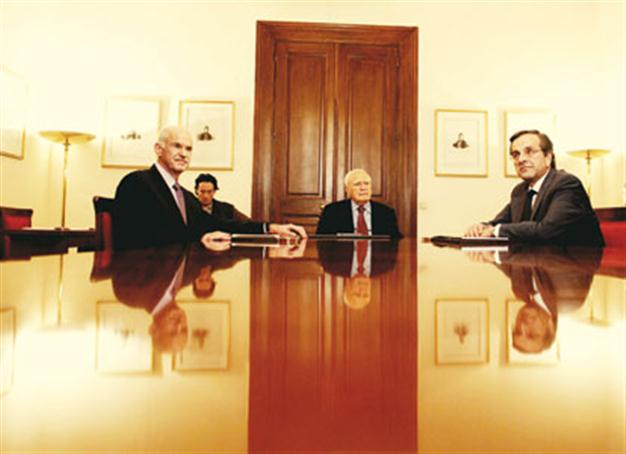Greece inks sketchy gov’t deal
ATHENS - Reuters

Greek Prime Minister George Papandreou (L), Greek President Karolos Papoulias (C) and opposition leader Antonis Samaras sit at the Presidential Palace in Athens on Nov 6. AP photo
Greek Prime Minister George Papandreou sealed a deal with the opposition on a crisis coalition to approve an international bailout, but details remain thin despite an EU ultimatum for Athens to get serious about tackling its problems.
With Greece due to run out of money in a few weeks, the European Union told bickering political parties to explain how they would form a unity government to get the 130-billion-euro ($180-billion) emergency funding.
Papandreou, who sealed his fate last week with a disastrous attempt to call a referendum on the bailout, will stand down when the new government takes over, the office of the Greek president said.
But otherwise Papandreou and conservative leader Antonis Samaras came up with the bare minimum to satisfy Brussels, and they must still agree on who will become the next prime minister.
A former deputy president of the European Central Bank (ECB), Lucas Papademos, is the front runner to become the new prime minister, Greek media said yesterday.
Papandreou’s side trumpeted the agreement, reached late Sunday at talks led by President Karolos Papoulias. “Today was a historic day for Greece,” government spokesman Ilias Mossialos said, adding that the new coalition would be sworn in and hold a confidence vote within a week.
First big step
“Finally!” the center-left daily Ta Nea said on its front page yesterday. “The first, big step has been taken to save the country.” Conservative daily Kathimerini wrote: “A first win.”
Others were less charitable. “I’m afraid the new government will very soon turn out to be problematic,” said Stefanos Manos, a conservative former finance minister.
The new coalition must win parliamentary approval for the bailout before calling early elections.
Papandreou’s socialist PASOK party and the New Democracy party of Samaras agreed early yesterday that the most suitable date for the elections would be Feb. 19 next year.
Brussels has piled pressure on Athens to approve the bailout, a last financial lifeline for Greece, fearing that its crisis will spill into much bigger eurozone economies such as Italy and Spain - which would be far harder to rescue.
Papandreou and Samaras had been scrambling to reach a deal before finance ministers of euro countries met in Brussels yesterday evening, to show that Greece is serious about taking steps needed to stave off bankruptcy.
Earlier, European Economic and Monetary Affairs Commissioner Olli Rehn told Reuters that finance ministers from eurozone countries would insist on hearing a plan for a unity government from their Greek colleague Evangelos Venizelos.
Mayhem in markets, unrest among social democrats
“We have called for a national unity government and remain persuaded that it is the convincing way of restoring confidence and meeting the commitments,” he told Reuters. “We need a convincing report on this by Finance Minister Venizelos.”
Papandreou had sought the referendum to show that harsh cuts demanded in the bailout had public support, but the risk that a “no” vote could bring about a sudden bankruptcy caused mayhem in markets and unrest in the ruling party.
He soon ditched the idea and won a confidence vote in parliament, but only after promising to make way for the national unity coalition.
















